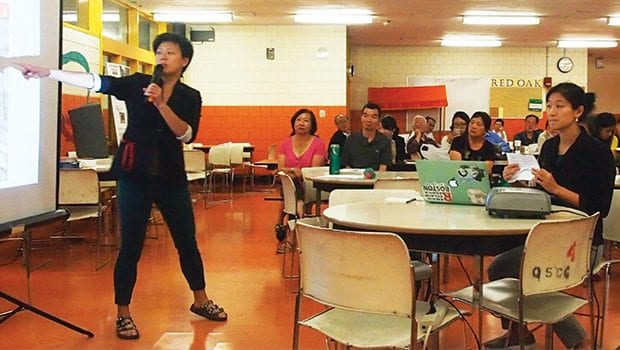
When Chinese Progressive Association organizer Karen Chen points to a map showing development in Chinatown, a profusion of luxury high-rises, marked in red, populate the projection screen. But when she highlights the affordable projects, just four small green spots appear on the map.
That map tells the story of the last 16 years, where the dense downtown neighborhood’s population doubled from fewer than 3,000 residents to the current 6,000, while the production of luxury units dwarfed the stock of affordable housing there. In 2000, there were just 561 market-rate units in Chinatown, many of them still affordable to Chinese families. Today there 3,444 market-rate units, almost all of them in high-rent, luxury apartment buildings.
Now, with just four publicly-owned parcels of land remaining in Chinatown, residents are hoping the city will give priority to affordable housing.
“Really, all that’s left to look at for affordable development are the public parcels,” said Debbie Chen, a community planner with the Asian Community Development Corporation.
Several dozen Chinatown activists met with city officials at the Quincy School last week to discuss strategies to stem the ongoing displacement residents are facing as pressure from for-profit developers continues to build. The activists want the Boston Redevelopment Authority to adhere to the Chinatown Master Plan, a document neighborhood residents created in 1990 and have amended as recently as 2010, to outline their goals for affordable housing and open space.
During the meeting activist Suzanne Lee asked BRA Planning Director Jonathan Greeley for a commitment to reserve the four remaining publicly-owned parcels for affordable housing.
“Some of these parcels have been in our master plan for more than ten years,” she said.
While Greeley did not commit to reserving parcels for affordable housing, he announced that the city would release a request for proposals for Parcel 12, a Tremont Street property that currently is being used as a parking lot, and that the RFP will include provisions for some affordability on the site.
“We’re very much aware of the strong desire to see an affordable housing component of Parcel 12, and that will be a strong component of the RFP,” he said. “Your comments are well taken, and I’ll certainly bring them back to our director.”
Asked whether the BRA could curtail the proliferation of luxury hotels in the area, Greeley said the BRA has little leverage to stop projects on privately-owned parcels.
“We have several projects currently under review,” Greeley said. “I would like to reiterate that these proposals are on private land being made by private developers.”
Asian Community Development Corporation Executive Director Angie Liou countered that the BRA could at least curtail the height of the projects, given that they exceeded zoning restrictions.
“There are a lot of projects where the developer is proposing something that’s two times the floor area ratio,” she said.
The developments are worsening traffic and density and removing historically significant buildings, Liou said.
A library
Other community concerns included a longstanding demand for a Chinatown branch of the Boston Public Library, which several residents said should go into a BRA-owned building at the corner of Washington and Essex streets.
BRA Deputy Director for Community Planning Laura Mérida said the BRA has been working with the Boston Public Library on a solution.
“It’s not just about space,” she said. “It’s also about providing services. We’re working with the library about how they can get services into Chinatown.”
Other demands included a call for the city to end the lease of Parcel R-1 to Tufts University Medical Center. The medical center uses the parcel, which formerly housed the South Cove YMCA, as employee parking. The lease is due to expire in 2017.
Chinatown resident Jianhua Tang asked the BRA for an accounting of lease payments and demanded to know how much the medical school is collecting in parking fees from the site.
“We don’t know where the money goes,” she said as residents applauded. “It’s not transparent.”
Many at the meeting expressed fears in which the neighborhood that generations of Chinese immigrants have called home would soon cease to exist.
“Chinatown matters to me,” said Chinatown Resident Yan Jing. “It matters to Chinatown residents. Hopefully, it matters to you all.”


![Banner [Virtual] Art Gallery](https://baystatebanner.com/wp-content/uploads/2024/04/Cagen-Luse_Men-at-store-e1713991226112-150x150.jpg)



